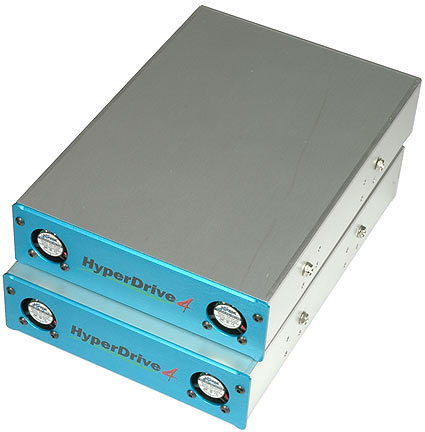HyperDrive 4 Redefines Solid State Storage
Conclusion: HyperDrive 4 The Fastest Of Its Kind
The claim of the HyperDrive 4 being the "fastest hard disk in the world" sounds like just more marketing hyperbole, but it's indeed true. HyperDrive 4 provides excellent throughput of up to 114 MB/s and virtually nonexistent read and write access times, which results in amazing real world performance. And it doesn't matter whether you run it with 2 GB of memory or with 16 GB.
The benchmark results, which the latest product by HyperOS / Accelerated Logic dominates at will, reflect this. And there is a more impressive side of performance, which is not sufficiently illustrated by the benchmark results, but that you experience when using the HyperDrive 4. Simply put, system responsiveness increases more than with any other hardware upgrade, and the delays you're familiar with (such as when launching a mighty application such as Adobe Photoshop) are almost gone. Not even the step from single core to dual core, or similar technology advances, were capable of introducing performance gains of this magnitude.
I'd love to recommend a HyperDrive to any real enthusiast, but the pricing certainly is out of range for the vast majority of us. Despite the impressive performance and the noticeable performance gains, I would not spend $2,500 (or much more, depending on how much memory you want) on such a product. Professional users who can turn performance into value they use to make money, or folks like database administrators, should not hesitate, as this product is what you want. Compared to earlier RAM-based solid state drives, it even swaps data onto a physical hard drive to prevent any data loss.
Speaking for anyone else, though, I have to put the brakes on: there will be more and better Flash SSDs within the next few months, and there will be a SATA/300 version of the HyperDrive by next year. Even so, I love the idea of making SDRAM the main memory technology for the operating system to work from: it would be beneficial if memory prices finally decreased in the same way Flash prices have declined over time. If I think about how the idea of a RAM drive could be used best, I would like to run my operating system off a hybrid hard drive to boot up quickly, and offload the entire operating system data as well as application data to the main memory. If only it were possible to equip PCs with 16 GB or 32 GB of RAM. Someday, maybe.
Join our discussion on this article!
Get Tom's Hardware's best news and in-depth reviews, straight to your inbox.
Current page: Conclusion: HyperDrive 4 The Fastest Of Its Kind
Prev Page Application Benchmark Results
Patrick Schmid was the editor-in-chief for Tom's Hardware from 2005 to 2006. He wrote numerous articles on a wide range of hardware topics, including storage, CPUs, and system builds.
